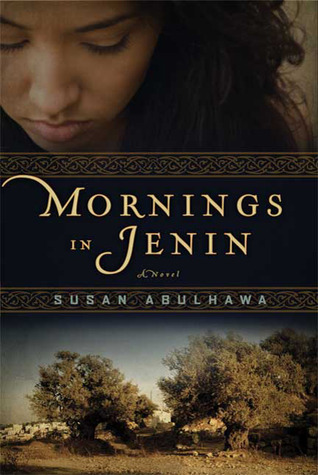 Hm... After finishing Mornings in Jenin, I'm not entirely sure what to think. I'm conflicted about it, which seems suitable, because it is a book of conflict. Centering largely around Amal, a Palestinian refugee, over the course of her life between the refugee camp of Jenin, an orphanage in Jerusalem, Philadelphia, Lebanon, and then some more of the same. Amal always seems to find herself in the center of whatever conflict is brewing between Israelis and Palestinians, and I keep coming back to this in reflecting on the book, because I ultimately had one big problem with it: it's very heavy handed.
Hm... After finishing Mornings in Jenin, I'm not entirely sure what to think. I'm conflicted about it, which seems suitable, because it is a book of conflict. Centering largely around Amal, a Palestinian refugee, over the course of her life between the refugee camp of Jenin, an orphanage in Jerusalem, Philadelphia, Lebanon, and then some more of the same. Amal always seems to find herself in the center of whatever conflict is brewing between Israelis and Palestinians, and I keep coming back to this in reflecting on the book, because I ultimately had one big problem with it: it's very heavy handed.The Israel/Palestine conflict is one that I don't want to get into, because quite frankly I don't want to start a fire. However, Abulhawa mentions in her afterword that someone said to her once that Palestinian literature is greatly lacking in presence in the Western world, which is one of the reasons she wrote Mornings in Jenin. I certainly agree with that, but in trying to right that, I think Abulhawa might have tried a bit too hard and shoved too much into one book. I felt for Amal, but towards the end of the book I found a thought crossing my mind: What a lovely piece of propaganda. It's not actually propaganda, of course, but Abulhawa spends much of the book beating readers over the head with one message: Israel and Israelis are evil. There are only two exceptions to this, but they're also not really exceptions. Ismael/David isn't evil, but he's really Palestinian. And Ari isn't evil, but he is what Abulhawa describes as a "self-hating Jew," and so is on the outside of Israeli civilization anyway. Meanwhile, the Palestinian characters are all, all, pretty much flawless. Even the characters who initially seem flawed, such as being cold or distant, are later excused as just loving too much.
The book also has a weird quirk where it lurches between tenses and perspectives; Amal is followed in both first and third person, as is her brother Yousef, and the transitions between the sections aren't always or even often smooth. Meanwhile, parts of the narrative jump between present and past tense, which helps to compound the confusion, as does the jumping between past and present in the narrative itself.
That's not to say that I didn't enjoy the book. As I said before, I felt for Amal, for her constant adrift-ness in the world and for the tragedies she kept facing. I cried at the end of the book--I am a sucker for a good death scene, though in this case it was more the funeral that got to me. But I admit I was still a little judgey towards Amal at this point, thinking, You knew what it was like, what could happen--how could you in good conscience take your daughter there? I liked the eventual re-entry of David/Ismael into the picture, but found how easy it was somewhat questionable. And the final bit of the book...hmmmm. It kind of seemed like acrobatics to make the narrative fit the facts of history.
Overall, this was a book that I think has an important place in its genre and in literature in general. However, it was heavy-handed and had problems with the narrative structure. The emotion is there and there's a sincerity to the whole story that resonates throughout the entire book, but I'm not sure that it overcame the other problems and I just couldn't bring myself to enjoy this as a story, even as a tragic one (which is, of course, its own sort of melancholy enjoyment).
2 stars out of 5.
No comments:
Post a Comment